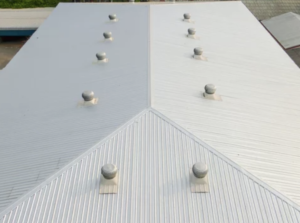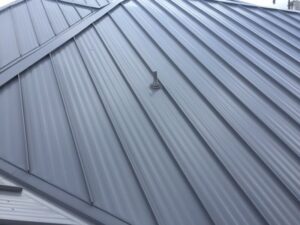
When it comes to commercial roofing, you have a number of options to choose from. Each type of commercial roofing comes with its own set of advantages and disadvantages that you should consider when making a decision.
In this blog post, we will go over the three most popular types of commercial roofing, as well as the pros and cons of each one so that you can make the most informed decision for your business.
Keep reading to learn more about the different types of commercial roofing and which one is right for your business.
PVC Roofing
PVC roofing is a popular commercial roofing choice due to its durability, longevity, and cost-effectiveness. PVC roofing is a single-ply membrane system made of polyvinyl chloride, a synthetic plastic material. It has been around since the 1960s and is known for its versatility, allowing it to be used in all types of climates, from very hot to very cold.
PVC roofing can last up to 40 years when properly installed and maintained. PVC roofs have great protection against UV rays, hail, wind, and fire. In addition to being watertight and energy efficient, PVC roofs are also resistant to common chemicals found in industrial settings such as ammonia and acid rain.
The main benefits of PVC roofs include their long-term cost savings. They require minimal maintenance and are light in weight compared to other types of commercial roofing, making them easy to install. They also provide excellent insulation and are resistant to damage from ultraviolet radiation, hail, and strong winds.
However, PVC roofs can become damaged if not installed correctly, and there is a risk of tearing due to excessive pressure or movement. They also tend to be more expensive than other types of commercial roofing materials. Additionally, PVC roofs may not be suitable for certain climates as they may not hold up well in colder temperatures.
TPO Roofing
Thermoplastic Polyolefin (TPO) is one of the most popular commercial roofing materials today. TPO is a single-ply roofing membrane that is made from polypropylene and ethylene-propylene rubber polymers and reinforced with fiberglass. It is designed to be resistant to ultraviolet, ozone, and chemical exposure.
TPO has many advantages as a commercial roofing material. It is lightweight, flexible, and can be applied quickly, which makes it an economical choice. It is also highly resistant to water and the chemicals present in many industrial applications, so it won’t need to be replaced as frequently as other types of roofing materials. Additionally, TPO is easy to repair and patch if needed.
TPO may not be the best choice in climates with extreme temperatures, as it can become brittle when exposed to cold weather. TPO roofs can also be prone to shrinking, which can cause seams to separate over time. Furthermore, since TPO isn’t as thick or durable as other types of roofing, it may not be the best choice for roofs that need to withstand intense wear and tear.

Metal Roofing
Metal is one of the most popular and widely used commercial roofing materials. It’s incredibly durable, fire resistant, and can last for decades with proper maintenance. Metal roofs are also available in a variety of colors and styles, so you’re sure to find something that will fit your aesthetic and budgetary needs.
On the downside, metal roofs tend to be more expensive than other types of commercial roofing. Additionally, they’re prone to dents and scratches if not installed correctly, so it’s important to hire a professional roofing contractor who has experience with this type of roof. Lastly, metal roofing can be quite loud during periods of rain or hail.
Overall, metal roofing is an excellent choice for commercial buildings due to its long lifespan and low-maintenance requirements. With proper installation and regular maintenance, a metal roof can easily last for several decades. Additionally, the wide range of colors and styles available make it a great option for businesses looking for a more aesthetically pleasing roof.
Still don’t know what commercial roofing material you should go with? Get your free commercial roofing inspection from ProCraft Exteriors today by clicking here!
